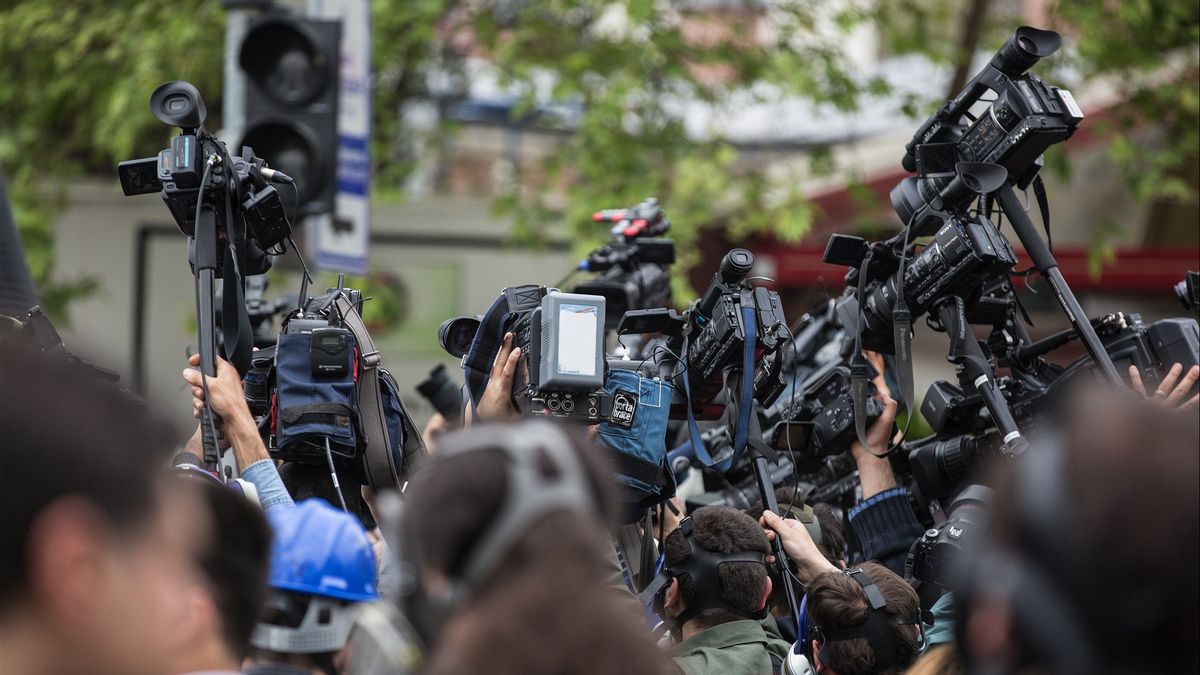JAKARTA - The Work Creation Bill (RUU) includes revisions to a number of articles in Law Number 40 of 1999 concerning the Press. At least, there are two articles that will be changed. The government is considered to be trying to rein in press freedom.
Chairman of the Alliance of Independent Journalists (AJI) Abdul Manan said the government had tried to 'disturb' two articles. First, about foreign capital and criminal provisions. The substance stated in Article 11 reads:
Additional foreign capital in press companies is carried out through the capital market. The Central Government develops the press business through investment in accordance with the provisions of the laws and regulations in the investment sector.
Then, the matter of criminal provisions in the draft Job Creation Bill is regulated in Article 18, it reads:
(1) Anyone who deliberately acts against the law with an effect that hinders or hinders the implementation of the provisions of Article 4 paragraph (2) and paragraph (3) shall be sentenced to imprisonment of up to 2 (two) years or a maximum fine of Rp. 2 billion.
(2) Press companies that violate the provisions of Article 5 paragraph (1) and paragraph (2), as well as Article 13 shall be subject to a maximum fine of Rp. 500 million. (2) Press companies that violate the provisions of Article 5 paragraph (1) and paragraph (2), as well as Article 13 shall be subject to a maximum fine of Rp. 2 billion.
(3) Press companies that violate the provisions of Article 9 paragraph (2) and Article 12 will be subject to a maximum fine of Rp100 million.
(3) Press companies that violate the provisions of Article 9 paragraph (2) and Article 12 will be subject to administrative sanctions.
(4) Further provisions regarding the types, amount of fines, procedures and mechanisms for the imposition of administrative sanctions as referred to in paragraph (3) shall be regulated in a Government Regulation.

Smells of New Order
Manan said that on the proposed revision of the article on the Press Law put forward by the government, AJI together with IJTI, PWI, and LBH Pers expressed their position of rejecting the government's efforts to intervene in the life of the press again.
"The intention to intervene again is seen in the Omnibus Law on Cipta Kerja which will make government regulations on the imposition of administrative sanctions against media companies, which are considered to have violated Article 9 and Article 12," Manan said in a written statement received by VOI in Jakarta, Sunday, 16 February.
Article 9 in Law 40/1999 contains provisions regarding press companies that must be in the form of Indonesian legal entities. Meanwhile, Article 12 regulates the matter of press companies which are obliged to publicly announce their names, addresses and responsible persons.
Law 40/1999 on the Press, which is the umbrella law for press freedom today, said Manan, was formed with the spirit of self-regulation and there is no government interference in it. This spirit cannot be separated from bad experiences during the New Order era. Where the government intervenes deeply in the field of the press.
Manan said that interference was shown by the government's authority to revoke the Press Issuance Business Permit (SIUPP), controlling the Press Council by placing the Minister of Information as chairman ex-officio, and establishing only one recognized journalist organization.
"These instruments are then used by the government to control and curb the press," he said.

The enactment of Law 40/1999 has the spirit of correcting the bad practices of the New Order government in curbing the press. This spirit was reflected, among others, by reaffirming the absence of censorship and scrutiny, the Press Council which was formed by the press community and without any representatives from the government, such as during the New Order era.
Apart from that, said Manan, Law 40/1999 also gave the Press Council the authority to formulate more operational provisions of the law. This means that the authority to implement this law rests entirely with the Press Council, not through government regulations as in laws in general.
"By reading this Job Creation Bill, which includes a proposed revision so that a Government Regulation regulates the imposition of administrative sanctions, is a form of setback for press freedom. This is tantamount to creating a 'back door' mechanism, or 'way of way. mice ', for the government to interfere in press affairs, "he said.
AJI, said Manan, was concerned that bad things during the New Order era would be repeated, in which the government used the pretext of administrative matters to curb the press. Therefore, AJI asked that the revision of this article be revoked.
Increase in fines
Not only that, AJI also rejected the increase in fines for press companies. In the proposed draft, the government proposed a revision of the fine sanctions for press companies. Manan assessed that this violates Law 40/1999, Article 5 paragraph 1 and paragraph 2, and Article 13.
Article 5 paragraph 1 regulates, "The national press is obliged to report events and opinions with respect to religious norms and a sense of public morality as well as the presumption of innocence".
Article 5 paragraph 2 contains the provisions of the question "The press is obliged to serve the Right to Reply". Meanwhile Article 13 regulates the issue of "prohibition of posting advertisements which among other things is degrading the dignity of a religion and or disturbing the harmony of life among religious believers, as well as against the sense of public morality".
In Law number 40 of 1999, the criminal provisions are regulated in Article 18 paragraph 2. "Press companies that violate the provisions of Article 5 paragraph (1) and paragraph (2), as well as Article 13 shall be subject to a maximum fine of Rp. 500 million," the article reads. the.
However, in the draft Work Creation Bill, the fine has increased to a maximum of Rp. 2 billion. "We question the urgency of increasing fines to more than 400 percent, from Rp. 500 million to Rp. 2 billion. In principle, we agree that there are sanctions for violations committed by the press. However, the sanctions should be in the spirit of correcting or educating," he said.
With such a large amount of fines, said Manan, his enthusiasm was not to educate but more nuanced of revenge. The existence of such a large sanction can also be used as a new tool to intimidate the press.
Government consistency
Apart from that, AJI also demands the government's consistency in implementing the Press Law. Manan said that the law had so far been deemed sufficient to protect press freedom. As long as it is implemented consistently. Increasing fines for people who violate Article 4 Paragraph 2 and 3 is not a solution to enforcing the Press Law.
Article 4 paragraph 2 of Law 40/1999 reads: The national press is not subject to censorship, banning or broadcasting prohibition.
Article 4 paragraph 3 contains guarantees for the national press in seeking, obtaining, and disseminating ideas and information.
"For us, what is more important is how consistency is in its implementation. So far, the actions of people who are judged to have violated the two verses include violence against journalists while carrying out their duties," he said.

Manan explained that the action was categorized as violating Article 4 paragraph 3 of the Press Law, but also included in the criminal category in the Criminal Code. So far, the perpetrators of violence against journalists are more often charged with the Criminal Code, which has a lighter sentence.
"If law enforcement officials want to protect press freedom, they should use the Press Law which has heavier sanctions, namely two years imprisonment or a fine of Rp. 500 million," he explained.
If the existing sanctions are rarely used, said Manan, it becomes a question of why the government is proposing a revision of the article.
"We get the impression that the government is running the politics of 'lip service', imaging, to give the impression of protecting press freedom, by increasing these types of fines. For us, what is far more substantive the government can do is consistency in the implementation of law enforcement on the Press Law," he said.
The English, Chinese, Japanese, Arabic, and French versions are automatically generated by the AI. So there may still be inaccuracies in translating, please always see Indonesian as our main language. (system supported by DigitalSiber.id)










